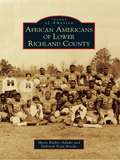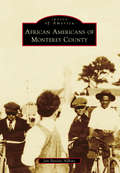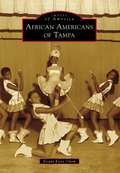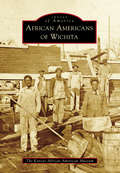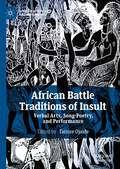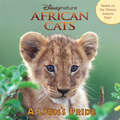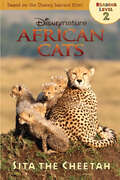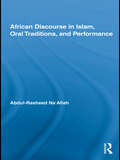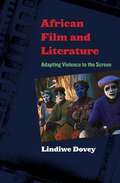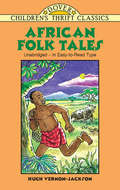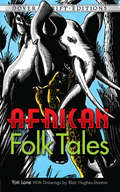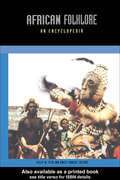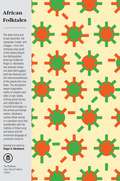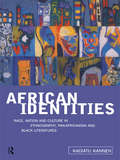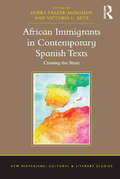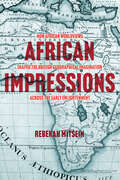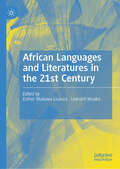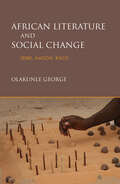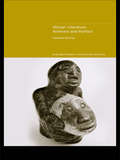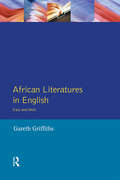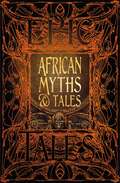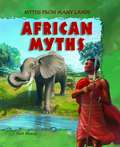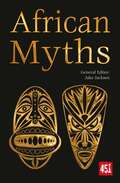- Table View
- List View
African Americans of Lower Richland County (Images of America)
by Deborah Scott Brooks Marie Barber AdamsLower Richland County encompasses approximately 360 square miles in the heart of South Carolina's geographic center. The Wateree River cradles it to the east, and the Congaree River borders the south and southwest. Virginia settlers discovered this rich land over 250 years ago. They became wealthy planters and accumulated large land tracts, creating plantation systems that sustained the economy. From 1783 until 1820, cotton was the principal cash crop, and the slave population increased tremendously and played a vital role in the development of agriculture and the economy in the area.
African Americans of Monterey County (Images of America)
by Jan Batiste AdkinsPeople of African heritage have traveled to Monterey since the 1770s, when African Spaniard Alexo Nino, a ship's caulker, traveled with Fr. Junipero Serra to Monterey via the San Antonio. For centuries since Nino, black men and women migrated to the Monterey Bay area in search of a new life. In the 20th century, some African Americans established businesses, bought homes, and encouraged family members and friends to settle in Monterey County. Others pursued military careers. Out of these communities came churches, schools, service organizations, and social groups. For the next century, the history of Monterey County's African American communities have mirrored the nation's slow progress toward integration with triumphs and setbacks that have been captured in images of employment opportunities, churches, business successes, and political struggles.
African Americans of New Orleans (Images of America)
by Phoenix Savage Turry FluckerEnslaved Africans and free people of color of Louisiana deserve the title of "Founding Fathers" just as much as the French, the Spanish, and the Americans. In spite of their subjugated role as slaves, African Americans of Louisiana, and subsequently New Orleans, were contributors to the success of the state and the city far beyond their role within the labor force. Imported into the Louisiana Territory by John Law's Company of the Indies, enslaved Africans, fed on a pound of corn a day, gave birth to American figures of the 19th and 20th centuries. Mahalia Jackson, Louis Armstrong, Homer Plessy, Marie Laveau, Buddy Bolden, Julies Lion, Alice Dunbar-Nelson, the fighting men of the Louisiana Native Guard, Ernest "Dutch" Morial, and many other African Americans contributed to the growth and development of New Orleans. Every African American citizen of New Orleans is intrinsically connected to the city's cultural and political landscape.
African Americans of Tampa (Images of America)
by Ersula Knox OdomTampa has a fascinating past that has been wonderfully documented with one exception: African Americans. This culturally rich community is virtually invisible in the eyes of history. Tampa's population exploded during the early 1900s, and the building boom universally required the skills and talents of African Americans, who provided services, labor, and entrepreneurship in a massive form. They played significant roles in everything from Tampa's wilderness era to its boomtown years and were key players in the first and second Seminole Wars with their Seminole alliance. African American soldiers captured Fort Brooke during the Civil War and fought in the Spanish-American War. Residents have endured Jim Crow, desegregation, and racial unrest yet thrived as entrepreneurs. Black Cubans, as part of the greater African American community, enabled Tampa's world-renowned cigar industry. The photographs found in this volume clearly illustrate Tampa's social and productive African American community.
African Americans of Wichita (Images of America)
by The Kansas African American MuseumThe African American community of Wichita is as old as the city itself, dating back to early pioneers, cowboys, and business figures. Once relatively integrated, Wichita became more segregated as the 20th century unfolded. In response, African Americans developed a lively neighborhood downtown with its own businesses, churches, schools, and organizations. World War II brought new populations to work in the aircraft industry and set the stage for profound changes. In the 1950s, a younger generation of leaders challenged racism and discrimination, unleashing a period of change that was both hopeful and painful. In recent years, the African American community has become more complex, with generations of established families joined by recent transplants, emigrants from Africa, and children of mixed marriages. While challenges remain, African Americans are more visible than ever before in local life, evident in politics, business, sports, and education.
African Battle Traditions of Insult: Verbal Arts, Song-Poetry, and Performance (African Histories and Modernities)
by Tanure OjaideThis book explores the “battles” of words, songs, poetry, and performance in Africa and the African Diaspora. These are usually highly competitive, artistic contests in which rival parties duel for supremacy in poetry composition and/or its performance. This volume covers the history of this battle tradition, from its origins in Africa, especially the udje and halo of the Urhobo and Ewe respectively, to its transportation to the Americas and the Caribbean region during the Atlantic slave trade period, and its modern and contemporary manifestations as battle rap or other forms of popular music in Africa. Almost everywhere there are contemporary manifestations of the more traditional, older genres. The book is thus made up of studies of contests in which rivals duel for supremacy in verbal arts, song-poetry, and performance as they display their wit, sense of humor, and poetic expertise.
African Cats: A Lion’s Pride
by Catherine HapkaFrom the Disney Nature film, African Cats. This book introduces readers to a lioness and her cub and their life on the African plains. Filled with fun lion facts!
African Cats: Sita the Cheetah
by Disney PressInspired by the journey of the cheetahs in the Disney Nature film, African Cats: The Kingdom of Courage.
African Discourse in Islam, Oral Traditions, and Performance (African Studies)
by Abdul-Rasheed Na'AllahThrough an engaged analysis of writers such as Wole Soyinka, Ola Rotimi, Niyi Osundare, and Tanure Ojaide and of African traditional oral poets like Omoekee Amao Ilorin and Mamman Shata Katsina, Abdul-Rasheed Na'Allah develops an African indigenous discourse paradigm for interpreting and understanding literary and cultural materials. Na'Allah argues for the need for cultural diversity in critical theorizing in the twenty-first century. He highlights the critical issues facing scholars and students involved in criticism and translation of marginalized texts. By returning the African knowledge system back to its roots and placing it side by side with Western paradigms, Na'Allah has produced a text that will be required reading for scholars and students of African culture and literature. It is an important contribution to scholarship in the domain of mobility of African oral tradition, and on African literary, cultural and performance discourse.
African Enchantment
by Andrea BarryPatricia Wells had vowed to forgo romance and dedicate herself to her career as a dance therapist. But then--on vacation amid the lush beauty of Africa--she encountered Armand de Vincent, a wealthy Frenchman. He was wild--as exciting and dangerous as Africa itself, and from the start, she was determined to resist the mad pounding of her heart that his mere presence caused. But she found herself captive to his intense blue gaze. How could she allow herself to fall for such a playboy?
African Film and Literature: Adapting Violence to the Screen (Film and Culture Series)
by Lindiwe DoveyAnalyzing a range of South African and West African films inspired by African and non-African literature, Lindiwe Dovey identifies a specific trend in contemporary African filmmaking-one in which filmmakers are using the embodied audiovisual medium of film to offer a critique of physical and psychological violence. Against a detailed history of the medium's savage introduction and exploitation by colonial powers in two very different African contexts, Dovey examines the complex ways in which African filmmakers are preserving, mediating, and critiquing their own cultures while seeking a united vision of the future. More than merely representing socio-cultural realities in Africa, these films engage with issues of colonialism and postcolonialism, "updating" both the history and the literature they adapt to address contemporary audiences in Africa and elsewhere. Through this deliberate and radical re-historicization of texts and realities, Dovey argues that African filmmakers have developed a method of filmmaking that is altogether distinct from European and American forms of adaptation.
African Folk Tales
by Hugh Vernon-Jackson Yuko GreenThis exciting collection of traditional African folk tales introduces you to a host of interesting people and unusual animals. Eighteen authentic fables, recorded as they were told by tribal members of Nigerian and other cultures, range from the imaginative "Story of a Farmer and Four Hyenas" to an entertaining account of "The Man with Seven Dogs."In "The Magic Crocodile," you'll meet a reptile with very strange powers, while "The Boy in the Drum" teaches a valuable lesson in the importance of obeying one's parents. In "The Hare and the Crownbird," a fine, feathered friend is rewarded for its acts of kindness. You'll also learn why a ram has a large head and a tortoise a small one in "The Greedy but Cunning Tortoise"; and in "A She-Goat and Her Children," you'll discover how a clever animal managed to provide food for her children.Set in large, easy-to-read type and enhanced with Yuko Green's 19 lively illustrations, this collection of time-honored folk tales will delight readers of all ages.
African Folk Tales (Dover Thrift Editions)
by Yoti Lane Blair Hughes-StantonA delight for readers and listeners of all ages, these 25 traditional tales from West Africa were originally accompanied by music and dance. The stories' drama and folk wisdom shine through in these captivating retellings, which are illustrated by evocative woodcut illustrations. Age-old fables explain why the leopard has no friends, how wild dogs became domesticated, and why pigs dig. Adventure stories recount a prince's quest for an ancient ivory horn and the struggles of two sisters, separated by slavery, to reunite. All of the stories are populated by memorable characters such as a greedy monkey and ambitious ants, a pair of crickets forced to sing for their supper, a couple of fishermen who compete for a bride, and the Man-in-the-Moon and his wife.
African Folklore: An Encyclopedia
by Philip M. Peek Kwesi YankahWritten by an international team of experts, this is the first work of its kind to offer comprehensive coverage of folklore throughout the African continent. Over 300 entries provide in-depth examinations of individual African countries, ethnic groups, religious practices, artistic genres, and numerous other concepts related to folklore. Featuring original field photographs, a comprehensive index, and thorough cross-references, African Folklore: An Encyclopedia is an indispensable resource for any library's folklore or African studies collection. Also includes seven maps.
African Folktales (The Pantheon Fairy Tale and Folklore Library)
by Roger AbrahamsNearly 100 stories from over 40 tribe-related myths of creation, tales of epic deeds, ghost stories and tales set in both the animal and human realms.Part of the Pantheon Fairy Tale and Folklore LibraryFrom the Trade Paperback edition.
African Identities: Pan-Africanisms and Black Identities
by Kadiatu KannehThis fascinating and well researched study explores the meaning generated by `Africa' and `Blackness' throughout the century. Using literary texts, autobiography, ethnography, and historical documents, African Identities discusses how ideas of Africa as an origin, as a cultural whole, or as a complicated political problematic, emerge as signifiers for analysis of modernity, nationhood and racial difference. Kanneh provides detailed readings of a range of literary texts, including novels by: * Toni Morrison * Alice Walker * Gloria Naylor * Ngugi Wa Thiong'o * Chinua Achebe * and V.S. Naipaul. For anyone interested in literature, history, anthropology, political writing, feminist or cultural analysis, this book opens up new areas of thought across disciplines.
African Immigrants in Contemporary Spanish Texts: Crossing the Strait (New Hispanisms: Cultural and Literary Studies)
by Debra Faszer-McMahon Victoria L. KetzAround the turn of 21st Century, Spain welcomed more than six million foreigners, many of them from various parts of the African continent. How African immigrants represent themselves and are represented in contemporary Spanish texts is the subject of this interdisciplinary collection. Analyzing blogs, films, translations, and literary works by contemporary authors including Donato Ndongo (Ecquatorial Guinea), Abderrahman El Fathi (Morocco), Chus Gutiérrez (Spain), Juan Bonilla (Spain), and Bahia Mahmud Awah (Western Sahara), the contributors interrogate how Spanish cultural texts represent, idealize, or sympathize with the plight of immigrants, as well as the ways in which immigrants themselves represent Spain and Spanish culture. At the same time, these works shed light on issues related to Spain’s racial, ethnic, and sexual boundaries; the appeal of images of Africa in the contemporary marketplace; and the role of Spain’s economic crisis in shaping attitudes towards immigration. Taken together, the essays are a convincing reminder that cultural texts provide a mirror into the perceptions of a society during times of change.
African Impressions: How African Worldviews Shaped the British Geographical Imagination across the Early Enlightenment
by Rebekah MitseinNineteenth-century European representations of Africa are notorious for depicting the continent with a blank interior. But there was a time when British writers filled Africa with landed empires and contiguous trade routes linked together by a network of rivers. This geographical narrative proliferated in fictional and nonfictional texts alike, and it was born not from fanciful speculation but from British interpretations of what Africans said and showed about themselves and their worlds. Investigations of the representation of Africa in British texts have typically concluded that the continent operated in the British imagination as a completely invented space with no meaningful connection to actual African worlds, or as an inert realm onto which writers projected their expansionist fantasies. With African Impressions, Rebekah Mitsein revises that narrative, demonstrating that African elites successfully projected expressions of their sovereignty, wealth, right to power, geopolitical clout, and religious exceptionalism into Europe long before Europeans entered sub-Saharan Africa. Mitsein considers the ways that African self-representation continued to drive European impressions of the continent across the early Enlightenment, fueling desires to find the sources of West Africa’s gold and the city states along the Niger, to establish a relationship with the Christian kingdom of Prester John, and to discover the source of the Nile. Through an analysis of a range of genres, including travel narratives, geography books, maps, verse, and fiction, Mitsein shows how African strategies of self-representation and European strategies for representing Africa grew increasingly inextricable, as the ideas that Africans presented about themselves and their worlds migrated from contact zones to texts and back again. The geographical narratives that arose from this cycle, which unfolded over hundreds of years, were made to fit expansionist agendas, but they remained rooted in the African worlds and worldviews that shaped them.
African Languages and Literatures in the 21st Century
by Esther Mukewa Lisanza Leonard MuakaThis edited book examines the crucial role still played by African languages in pedagogy and literatures in the 21st century, generating insights into how they effectively serve cultural needs across the African continent and beyond. Boldly positioning African languages as key resources in the 21st century, chapters focus on themes such as language revolt by marginalized groups at grassroots level, the experience of American students learning African languages, female empowerment through the use of African languages in music, film and literary works, and immigration issues. The contributions are written by scholars of language, literature, education and linguistics, and the book will be of interest to students and scholars in these and related areas.
African Literature and Social Change: Tribe, Nation, Race
by Olakunle George“George rethinks the entirety of African literature by considering texts from the 19th century and mid-20th century alongside canonical texts.” —Neil ten Kortenaar, author of Debt, Law, RealismAlert to the ways in which critical theory and imaginative literature can enrich each other, African Literature and Social Change reframes the ongoing project of African literature. Concentrating on texts that are not usually considered together—writings by little-known black missionaries, so called “black whitemen,” and better-known 20th century intellectuals and creative writers—Olakunle George shows the ways in which these writings have addressed notions of ethnicity, nation, and race and how the debates need to be rehistoricized today. George presents Africa as a site of complex desires and contradictions, refashioning the way African literature is positioned within current discussions of globalism, diaspora, and postcolonialism.“A bold exploration of the complexity of different modes of writing about Africa in the context of current debates on the nature of the literary in the production of African knowledge. Concerned with a rhetoric of self-writing as it has developed over two hundred years, Olakunle George attends to local details within the larger configurations of colonial discourse in this ambitious and timely work. It is a caution against the neglect of the conditions of possibility that made an African literature possible.” —Simon Gikandi, author of Slavery and the Culture of Taste“A new and welcome addition to the field of African literary studies, Olakunle George’s African Literature and Social Change is dense where it needs to be and glories in productive close readings when its objects call for it.” —Comparative Literature Studies
African Literature, Animism and Politics: Animism And Politics (Routledge Research in Postcolonial Literatures #Vol. 4)
by Caroline RooneyThis book marks an important contribution to colonial and postcolonial studies in its clarification of the African discourse of consciousness and its far-reaching analyses of a literature of animism. It will be of great interest to scholars in many fields including literary and critical theory, philosophy, anthropology, politics and psychoanalysis.
African Literatures in English: East and West (Longman Literature In English Series)
by Gareth GriffithsHere is an introduction to the history of English writing from East and West Africa drawing on a range of texts from the slave diaspora to the post-war upsurge in African English language and literature from these regions.
African Myths & Tales: Epic Tales (Gothic Fantasy)
by Flame Tree StudioAfrica south of the Sahara is a land of wide-ranging traditions and varying cultures. Despite the diversity and the lack of early written records, the continent possesses a rich body of folk tales and legends that have been passed down through the strong custom of storytelling and which often share similar elements, characters and ideas between peoples. So this collection offers a hefty selection of legends and tales – stories of the gods, creation and origins, trickster exploits, animal fables and stories which entertain and edify – from &‘Obatala Creates Mankind&’, from the Yoruba people of west Africa, to &‘The Girl Of The Early Race, Who Made Stars&’, from the San people of southern Africa, all collected in a gorgeous gold-foiled and embossed hardback to treasure.
African Myths (Myths From Many Lands)
by Neil Morris Graham KennedyReaders learn the mythological explanations of how the universe was created, the sun was stolen, and how a spider gained the world's collection of stories.
African Myths (The World's Greatest Myths and Legends)
by Flame Tree StudioSub-Saharan Africa is a land of colourful contrasts and diverse cultures. Despite the destructive influences of colonialism and the slave trade and the lack of early written records, Africa has persevered with its powerful tradition of storytelling, with tales of its history passed down in songs and stories through the generations. Because of the huge diversity of lifestyles and traditions, no real unified mythology exists in Africa, but broadly speaking, a number of beliefs, ideas and themes are shared by African peoples. So this collection offers a selection of descriptions and tales, often those recorded faithfully by some of the first to put them to paper – tales of the gods, creation stories, trickster adventures, animal fables and stories which amuse and teach – from Olukun&’s Revenge, from the Yoruba people of west Africa, to The Story of the Glutton, from the Bantu-speaking peoples of east Africa, all brought together with the aim of providing an insight into the boundless and vibrant world of African myth. FLAME TREE 451: From mystery to crime, supernatural to horror and myth, fantasy and science fiction, Flame Tree 451 offers a healthy diet of werewolves and mechanical men, blood-lusty vampires, dastardly villains, mad scientists, secret worlds, lost civilizations and escapist fantasies. Discover a storehouse of tales gathered specifically for the reader of the fantastic.
